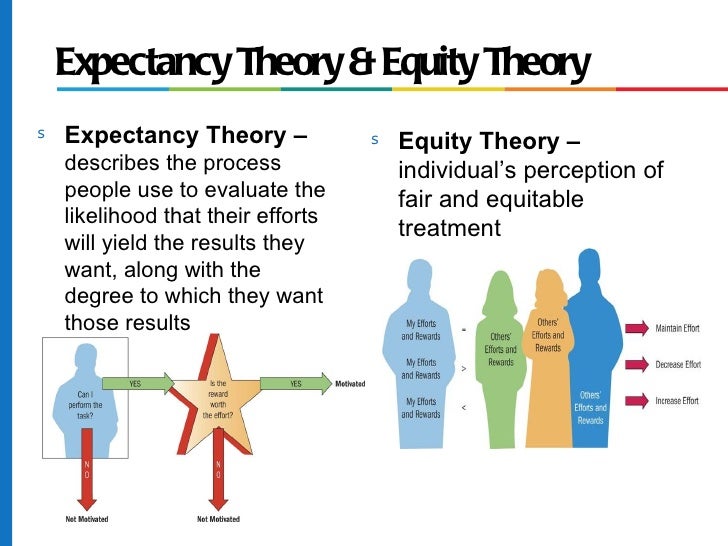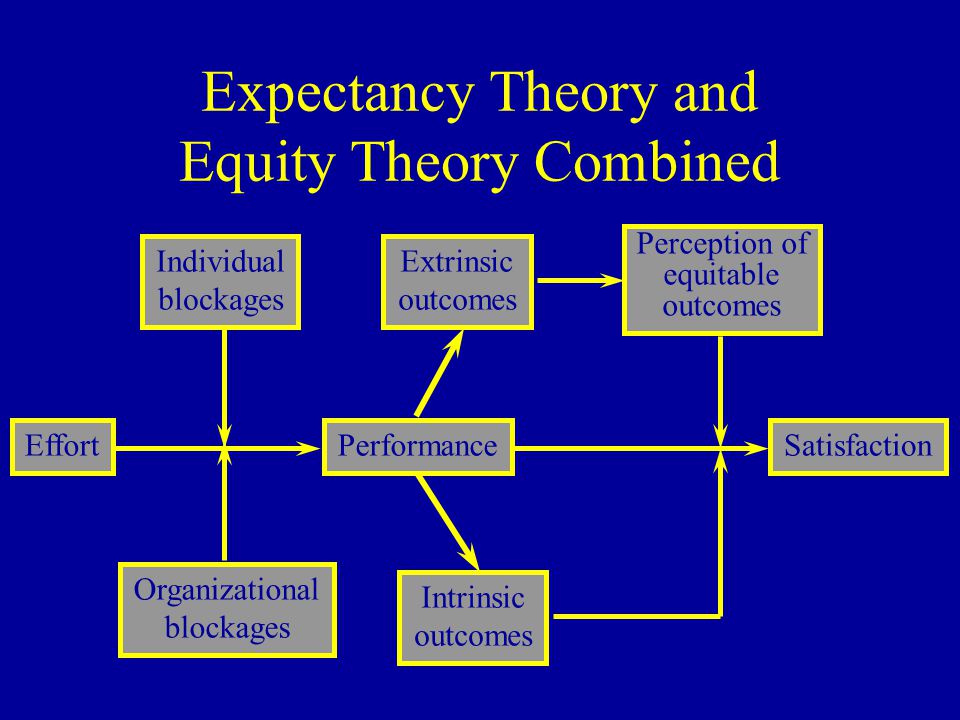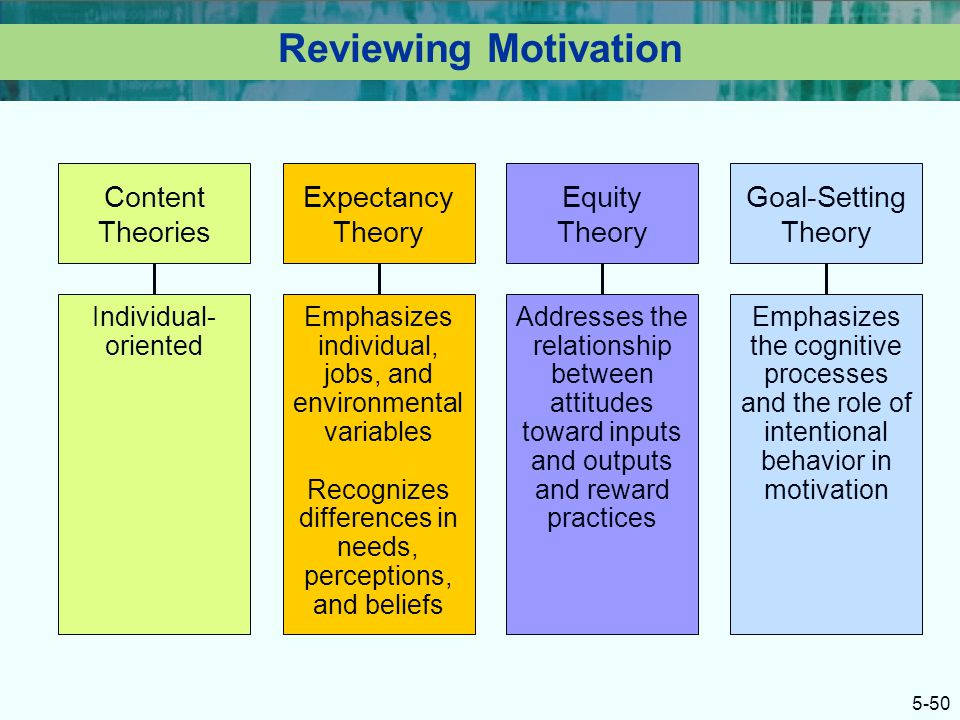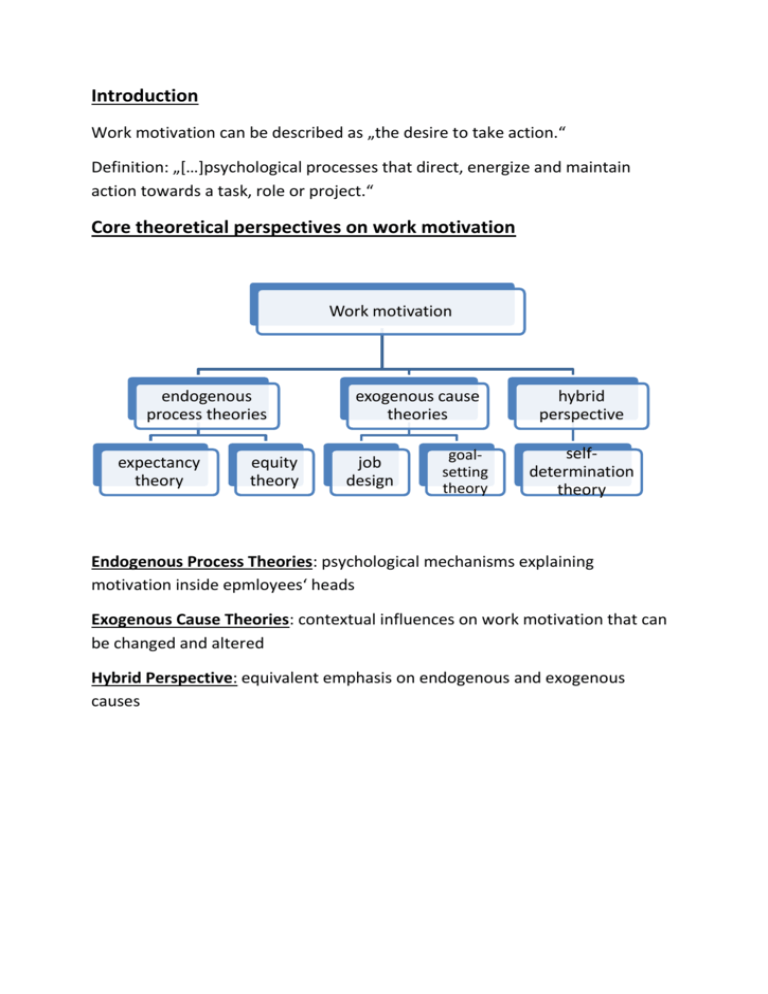Explain How Equity Theory Differs From Expectancy Theory
Explain how goals and needs motivate people and what kinds of goods are likely to result in high performance. Using what you know about equity theory expectancy theory and organizational justice.
The Process Theories Of Motivation
The components of the equity theory are inputs outcomes and referents.

. Kulsoom Abdullah Sania Gul 2. Briefly explain goal-setting theory reinforcement theory expectancy theory equity theory. This theory is dependent on how much value a person places on different motivations resulting in a decision they expect will give them the highest return.
Expectancy instrumentality and valence. What is the difference between transformational leadership and transactional leadership. If the ratio is fair or equitable they feel satisfied.
Use equity theory to explain how employees perceptions of fairness affect motivation. Expectancy theory focuses on three relationships 1. Expectancy theory has three components.
Victor Vrooms Expectancy Theory The theory states that individuals have different sets of goals and can be motivated if they believe that. Motivation provides reasons for peoples action desires and needs. Motivation is the theoretical concept which attempts to explain human behavior.
There is a positive correlation between efforts and performance. Process theories attempt to explain and describe how people start sustain and direct behavior aimed at the satisfaction of needs or the reduction of inner tension. Expectancy is the individuals belief that effort will lead to the intended performance goals.
Equity theory explains motivation as a drive towards reducing perceived inequity. This essay will outline how two process theories Equity theory and Expectancy theory explain motivation at work. Expectancy describes the persons belief that I can do this.
Adams Equity Theory also known as the Equity Theory of Motivation was developed in 1963 by John Stacey Adams a workplace behavioral psychologist. We will also highlight similarities between needs- and process-based theories and the management implications of the each of the process theories. The major variables in process models are incentive drive reinforcement and expectancy.
Equity also considers procedural justice the perceived fairness of the process used to determine the distribution of rewards. Usually this belief is based on an individuals past experience self-confidence and the. The difference between expectancy theory and equity theory needs substantial analysis as both explain how employees relationships evolve in a working environment.
Use expectancy theory to describe how workers expectations about rewards effort and the link between rewards and performance influence motivation. Imagine you are Sophia. A thought process is required to make the connections between performance effort and outcomes.
The expectancy theory of motivation or the expectancy theory is the belief that an individual will choose their behaviors based on what they believe will lead to the most beneficial outcome. Employees compare their outcomes to their inputs. What do you do now to maintain the highest possible motivation among the greatest number of.
These include education and training intelligence experience effort number of. When discussing the equity theory it is important to distinguish between equity theory of motivation and expectancy theory as both thesis are often interlinked. Adams Equity Theory of Motivation and Vrooms Expectancy Theory.
Favorable performance will result. Equity Theory is based on the idea that individuals are motivated by fairness. While Expectancy theory emphasizes self interest in the alignment of rewards with employees wants Equity theory also considers the equity or inequity within a group.
The expectancy theory emphasizes that people will be motivated when they believe their efforts will lead to. Here we review a field experiment of 198 employees and their relation to being reassigned in different offices that are either overpaid or underpaid. If the reward is fair with their expectation they are motivated.
In simple terms equity theory states that if an individual identifies an inequity between themselves and a peer. People derive job satisfaction by comparing their effort and reward ratio with others. Historically equity theory focused on distributive justice the employees perceived fairness of the amount and allocation of rewards among individuals and who received them.
Equity Expectancy and Goal setting are the three motivational theories discussed throughout this paper. Two factor theory expectancy theory equity theory 1. Using what you know about equity theory expectancy theory and organizational justice explain why Stephen and Bianca have different perceptions of what fairness means when it comes to implementing summer hours.
Using what you know about equity theory expectancy theory and organizational justice explain why Stephen and Bianca have different perceptions of what fairness means when it comes to implementing summer hours. People perform actions in exchange for rewards based on their conscious expectations. Expectancy theory had to do more with the expectations and rational responses wherein equity theory had to do more with rational and irrational behavior of the individual in the group and those.
Up to 24 cash back The equity theory is defined as a theory that states that people will be motivated when they perceive that they are being treated fairly. Identify the motivation lessons that managers can learn from operant. It takes a conscious approach that a reasonable person would be able to apply.
Equity theory is defined as social comparisons to others in the workforce. Equity theory expectancy theory and reinforcement theory are all process-based concepts positing that human behavior is based on predictable processes of environmental or situational analysis. The key difference between expectancy theory and equity theory is that according to expectancy theory people perform actions in exchange for rewards based on their conscious expectations but equity theory suggests that people derive job satisfaction by comparing their effort and reward ratio with others.
Inputs are the contributions employees make to the organization. Expectancy theory or VIE theory is one of the stronger theories to help explain motivation. What managers should do to have a highly motivated workforce.
Question Description 1Describe from the perspectives of the expectancy theory and equity theory. We make judgments on the level of inequity by comparing our rewards and contributions with the outputs and inputs of others 19631965 Adams cited in Buchanan.

Custom Essay Amazonia Fiocruz Br

Chapter 11 Motivating Employees Fundamentals Of Business

Expectancy Theory Or What Makes Up Motivation For Employees Instrumentality Expectancy And Valence Value Motivation Theory Data Science Learning Motivation

Expectancy Theory Links To Pay Satisfaction Download Scientific Diagram

Expectancy Theory Goal Theory And Extended Expectancy Theory Download Scientific Diagram

Introduction Work Motivation Can Be Described As The Desire To Take Action Definition Psychological Processes That Direct Energize And Maintain Ppt Download

Expectancy Theory Of Motivation Youtube

Equity And Expectancy Theory Youtube

Managing People In Organisations Week 7 Motivation Process Theories Ppt Download
Different Motivational Theories For Compensation Scheme
Equity Theory Expectancy Theory Motivation Today

Motivation Ii Equity Expectancy And Goal Setting Ppt Download
Spring 2015 Expectancy Theory Psych 484 Work Attitudes And Job Motivation Confluence

Difference Between Expectancy Theory And Equity Theory Compare The Difference Between Similar Terms

Chapter 8 Motivation Cognitive And Behavioral Theories And Techniques Ppt Video Online Download

Chapter 5 Motivation Ppt Video Online Download

Process Theories Indiafreenotes

Motivation Expectancy Theory Of Work Motivation Jones And George 289 Expectancy Theory Formulated By Victor H Vroom In The 1960 S States That Motivation Ppt Download

Comments
Post a Comment